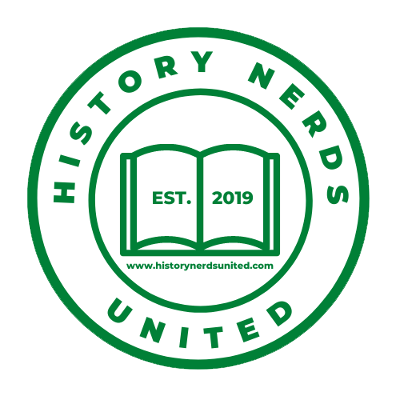I don’t have much of an ego when it comes to this site (in my actual life, people may disagree). This is niche blogging to say the least and I am okay with it. Every now and again, however, something happens which makes me think maybe this whole thing isn’t me screaming about history into the void.
A while back, while cleaning the spam folder (which fills up much faster than the comments section), I saw an email from what looked like an actual person. Reading further, I realized it wasn’t just a fellow nerd. It was Eric Jager, whose book The Last Duel I had just reviewed.
Many thoughts went through my mind at once. Thank God I check this filter. Why would a published author give a damn what I think of his book? Why would he also take the time to tell me thank you? And he thinks the History Nerds United name is great!?
One more thing. Isn’t The Last Duel about to become a movie with people I’ve actually heard of? (Spoiler alert: Hell yeah.)
When my hyperventilating stopped and I called my mother to tell her I finally made it in this world, I came up with a plan. I must take advantage of this man’s kindness and selflessness for my own purposes. Luckily, he played along. Here is part 1 of my interview with Eric Jager.
(If you want to know more about Eric before starting, head here.)
(HNU) Eric, thank you so much for taking the time to answer questions for my tiny blog. You are an accomplished professor, author, and your fantastic book The Last Duel is becoming a movie. You wear many hats, but did you always want to be an author?
(EJ) Thank you for your kind words, Brendan, and for having me as a guest on your wonderful history site. Writing books was not actually one of my childhood dreams. I wanted to be a major league baseball player or an astronaut. Still, I loved reading, and there were lots of books in our home, plus weekly trips to the library. Books have always been a big part of my life, and I’m usually reading three or four concurrently.
(HNU) Do you see yourself as a professor who writes on the side or a writer who teaches? Am I being completely reductive?
(EJ) Teaching at a large research university, I’m expected to publish. And I published my first two books, very scholarly ones, to earn tenure and a full professorship. Then I began working on The Last Duel, a story I’d been mulling over for nearly a decade, hoping it would appeal to a more popular audience. So, I guess I’m a professor who writes, but not exactly “on the side,” since research and publishing are central to my work. That said, I really enjoy writing. And for the past few years I’ve also enjoyed teaching a nonfiction workshop in my department alongside my usual courses in medieval literature — Beowulf, Chaucer, etc.
(HNU) How do you possibly find the time to do everything you do?
(EJ) I’ve been fortunate to have reasonable teaching loads and regular teaching leaves, and a few years ago I gave up summer teaching to free up more time. Also, my wife, Peg, has joined me on my research trips to France over the years and has been a big help in reading my work critically, suggesting revisions, and also strategizing about book promotion. In fact, it was thanks to Peg that The Last Duel got its first major review shortly after publication.
(HNU) The Last Duel and Blood Royal, both of which I read and loved are books about very little-known historic events. Do you find these events because you are a scholar of medieval literature or do you stumble on them by going down a Wikipedia rabbit hole late on a Saturday night like me?
(EJ) Thank you, I’m so glad you enjoyed them! Years ago, I stumbled across the 1386 duel in the well-known chronicle by Jean Froissart, and I went looking for a book that would tell me more about this famous, controversial trial by combat. But no such book existed. So, I decided to write one myself, in part to answer my own questions about the case. As for Blood Royal, the impetus lay in the final chapter of The Last Duel, where the young king who witnessed the duel goes mad a few years later. This brings to power his widely hated brother, who gets himself brutally murdered one dark November night, plunging France into civil war. When I learned that a detailed police report on the murder investigation had survived, that clinched it.
(HNU) Both of these books ultimately hinge on the way crimes are dealt with during their time periods. Did you ever stop and think about how insane the methods (or lack thereof) of the time were? It seems amazing any crimes could be solved.
(EJ) You’re right. It seems crazy to us today to settle a rape accusation with a duel. But in trying to understand this story during my research, I learned that the purpose of trial by combat was to test the competing oaths sworn by the two combatants just prior to fighting. Of course, today we expect judges or juries to decide between the competing stories told in court. But if you take the view, as many did back then, that God oversaw a duel and would assure a just outcome, you can begin to think your way back into a medieval outlook. As for the murder mystery in Blood Royal, I saw the courageous investigator, Guillaume, as one of history’s first detectives, and the almost scientific rigor of his methods as a glimmer of modernity in that dark medieval city.
(HNU) A historic event may be very interesting, but it does not necessarily have enough content to be a full-length book. How do you decide what is book worthy? Do you start writing about something but find there isn’t enough material to work with?
(EJ) You’re right that some fascinating moments of history are only thinly documented. I was fortunate with The Last Duel that so many sources had survived, including detailed records from the Parlement of Paris and even one of the lawyer’s private notes on the case. And I never would have been able to write Blood Royal without the thirty-foot parchment scroll left behind by the chief investigator, complete with an autopsy and eyewitness testimony. Such a thing is incredibly rare from that era. It enabled me to track his inquiry in detail and even to figure out how he cracked the case. Such records are essential. Without them you hit a brick wall or opt to write historical fiction.
(HNU) How much time writing a book is devoted to research as opposed to actual writing?
(EJ) It’s hard for me to say, since I don’t strictly separate the two. Still, there might be several years of collecting and studying sources, then drawing up outlines or timelines, and so forth. Also, the archival research often punctuates the writing. With my current project, I’ve been to France several times since starting it, bringing back more material each time. The Last Duel came out only four years after my previous book, but as mentioned, I’d been thinking about that story a long time. Blood Royal took another ten years. And for the past seven years I’ve been working on my “new” project. Clearly, I’m not a fast worker!


Leave a Reply
You must be logged in to post a comment.